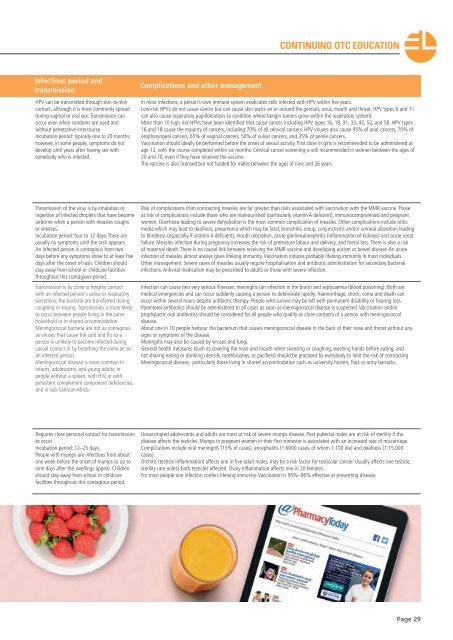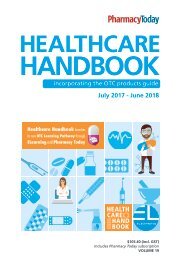2017 HCHB_digital
You also want an ePaper? Increase the reach of your titles
YUMPU automatically turns print PDFs into web optimized ePapers that Google loves.
CONTINUING OTC EDUCATION<br />
Infectious period and<br />
transmission<br />
HPV can be transmitted through skin-to-skin<br />
contact, although it is most commonly spread<br />
during vaginal or oral sex. Transmission can<br />
occur even when condoms are used and<br />
without penetrative intercourse.<br />
Incubation period: typically one to 20 months;<br />
however, in some people, symptoms do not<br />
develop until years after having sex with<br />
somebody who is infected.<br />
Complications and other management<br />
In most infections, a person’s own immune system eradicates cells infected with HPV within five years.<br />
Low-risk HPVs do not cause cancer but can cause skin warts on or around the genitals, anus, mouth and throat. HPV types 6 and 11<br />
can also cause respiratory papillomatosis (a condition where bengin tumors grow within the respiratory system).<br />
More than 10 high-risk HPVs have been identified that cause cancer, including HPV types 16, 18, 31, 33, 45, 52, and 58. HPV types<br />
16 and 18 cause the majority of cancers, including 70% of all cervical cancers. HPV viruses also cause 95% of anal cancers, 70% of<br />
oropharyngeal cancers, 65% of vaginal cancers, 50% of vulvar cancers, and 35% of penile cancers.<br />
Vaccination should ideally be performed before the onset of sexual activity. First dose in girls is recommended to be administered at<br />
age 12, with the course completed within six months. Cervical cancer screening is still recommended in women between the ages of<br />
20 and 70, even if they have received the vaccine.<br />
The vaccine is also licensed but not funded for males between the ages of nine and 26 years.<br />
Transmission of the virus is by inhalation or<br />
ingestion of infected droplets that have become<br />
airborne when a person with measles coughs<br />
or sneezes.<br />
Incubation period: four to 12 days. There are<br />
usually no symptoms until the rash appears.<br />
An infected person is contagious from two<br />
days before any symptoms show to at least five<br />
days after the onset of rash. Children should<br />
stay away from school or childcare facilities<br />
throughout this contagious period.<br />
Transmission is by close or lengthy contact<br />
with an infected person's saliva or respiratory<br />
secretions; the bacteria are transferred during<br />
coughing or kissing. Transmission is more likely<br />
to occur between people living in the same<br />
household or in shared accommodation.<br />
Meningococcal bacteria are not as contagious<br />
as viruses that cause the cold and flu so a<br />
person is unlikely to become infected during<br />
casual contact or by breathing the same air as<br />
an infected person.<br />
Meningococcal disease is more common in<br />
infants, adolescents, and young adults; in<br />
people without a spleen, with HIV, or with<br />
persistent complement component deficiencies;<br />
and in sub-Saharan Africa.<br />
Risk of complications from contracting measles are far greater than risks associated with vaccination with the MMR vaccine. Those<br />
at risk of complications include those who are malnourished (particularly vitamin A deficient), immunocompromised and pregnant<br />
women. Diarrhoea leading to severe dehydration is the most common complication of measles. Other complications include otitis<br />
media which may lead to deafness, pneumonia which may be fatal, bronchitis, croup, conjunctivitis and/or corneal ulceration leading<br />
to blindness (especially if vitamin A deficient), mouth ulceration, acute glomerulonephritis (inflammation of kidneys) and acute renal<br />
failure. Measles infection during pregnancy increases the risk of premature labour and delivery, and foetal loss. There is also a risk<br />
of maternal death. There is no causal link between receiving the MMR vaccine and developing autism or bowel disease. An acute<br />
infection of measles almost always gives lifelong immunity. Vaccination induces probably lifelong immunity in most individuals.<br />
Other management: Severe cases of measles usually require hospitalisation and antibiotic administration for secondary bacterial<br />
infections. Antiviral medication may be prescribed to adults or those with severe infection.<br />
Infection can cause two very serious illnesses: meningitis (an infection in the brain) and septicaemia (blood poisoning). Both are<br />
medical emergencies and can occur suddenly causing a person to deteriorate rapidly. Haemorrhage, shock, coma and death can<br />
occur within several hours despite antibiotic therapy. People who survive may be left with permanent disability or hearing loss.<br />
Parenteral antibiotics should be administered to all cases as soon as meningococcal disease is suspected. Vaccination and/or<br />
prophylactic oral antibiotics should be considered for all people who qualify as close-contacts of a person with meningococcal<br />
disease.<br />
About one in 10 people harbour the bacterium that causes meningococcal disease in the back of their nose and throat without any<br />
signs or symptoms of the disease.<br />
Meningitis may also be caused by viruses and fungi.<br />
General health measures (such as covering the nose and mouth when sneezing or coughing, washing hands before eating, and<br />
not sharing eating or drinking utensils, toothbrushes, or pacifiers) should be practised by everybody to limit the risk of contracting<br />
Meningococcal disease, particularly those living in shared accommodation such as university hostels, flats or army barracks.<br />
Requires close personal contact for transmission<br />
to occur.<br />
Incubation period: 12–25 days.<br />
People with mumps are infectious from about<br />
one week before the onset of mumps to up to<br />
nine days after the swellings appear. Children<br />
should stay away from school or childcare<br />
facilities throughout this contagious period.<br />
Unvaccinated adolescents and adults are most at risk of severe mumps disease. Post-pubertal males are at risk of sterility if the<br />
disease affects the testicles. Mumps in pregnant women in their first trimester is associated with an increased rate of miscarriage.<br />
Complications include viral meningitis (15% of cases), encephalitis (1:6000 cases, of whom 1:100 die) and deafness (1:15,000<br />
cases).<br />
Orchitis (testicle inflammation) affects one in five adult males, may be a risk factor for testicular cancer. Usually affects one testicle,<br />
sterility rare unless both testicles affected. Ovary inflammation affects one in 20 females.<br />
For most people one infection confers lifelong immunity. Vaccination is 95%–96% effective at preventing disease.<br />
Page 29



